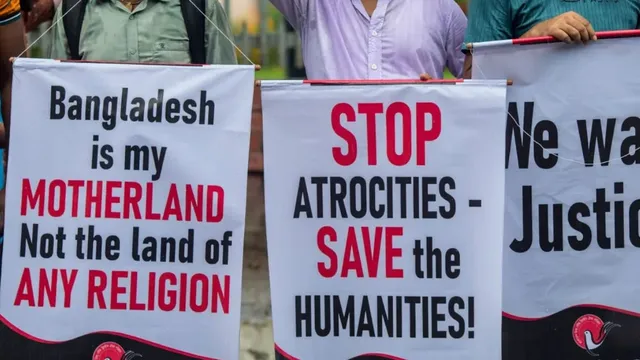
Bangladesh court denies bail to Hindu leader fighting for minority rights
2025-01-02 07:02- Krishna Das Prabhu, a jailed Hindu leader, faces sedition charges after leading rallies.
- The court's rejection of his bail plea was amid heightened security due to past violence.
- The ongoing violence underscores the urgent need for safeguarding minority rights in Bangladesh.
Express your sentiment!
Insights
In southeastern Bangladesh, tensions have escalated regarding the treatment of minority groups, particularly Hindus and Christians. Reports indicate that since the significant political changes in August, when the previous secular government led by Prime Minister Sheikh Hasina was overthrown, there have been widespread allegations of violence and discrimination against these communities. Krishna Das Prabhu, a Hindu leader who had been vocal about the need for better security for minorities, was arrested in November in Dhaka and faces serious charges, including sedition. His arrest came during a time of heightened conflict, following incidents involving the desecration of the Indian flag and backlash from both Hindu and Muslim communities. On Thursday, January 2, 2025, Prabhu's plea for bail was rejected by Chattogram Metropolitan Sessions Judge Saiful Islam. This hearing took place under heavy police and military presence, highlighting the sensitive nature of the situation. Public Prosecutor Mofizul Haque Bhuiyan argued against granting bail, citing concerns that Prabhu's release could lead to further unrest and violence, particularly given that he had allegedly instigated protests in the past. Prabhu's legal team announced intentions to appeal the bail denial. The atmosphere in Bangladesh regarding religious minorities has been characterized by fear and violence. Reports noted that on Christmas Day, 17 out of 19 houses belonging to the Christian community in Notun Tongjhiri Tripura Para were set ablaze by unidentified individuals. This act of terrorism against the minority community occurred as they were celebrating a significant religious festival, marking another chapter in the ongoing crisis facing religious minorities in the country. Human rights groups, along with the Inter-Religious Solidarity Council, have condemned the acts of violence and called for government intervention to protect religious rights. They argue that the targeting of minorities is not only an attack on their rights but also a violation of democratic principles. Activists emphasize the urgent need for inter-community dialogue and for the government to assure the safety of all citizens, regardless of faith, while also holding accountable those responsible for the violence against minorities.
Contexts
In the heart of Bangladesh, a storm of unrest has left a trail of desolation, particularly for its minority communities. Protests demanding governmental reform have escalated into violence, leading to the tragic deaths of nearly 300 individuals. Amidst this turmoil, Christians, who make up less than 0.5% of the population, have found themselves increasingly vulnerable. Recent attacks have seen churches vandalized and homes raided, as adversaries from the Muslim majority target those they perceive as sympathizers of the earlier administration. The situation has become dire for families like that of Ranjit Kisku, who recalls the horror when a mob descended upon his home. “I had everything but now I have nothing,” he laments, recounting how armed men overturned his life in mere moments. His story is not isolated; reports indicate that the assaults extend to Hindu families as well, exacerbating the crisis among religious minorities that have lived in relative quiet until now. International bodies, including the EU and US, have raised alarms about the ongoing violence, calling for restorative actions to ensure communal harmony. Yet, the streets of Dhaka may appear calm, distant villages continue to grapple with fear of further assaults. Voices from the battered communities emphasize their urgency for support, urging the government to restore safety amid the rampant lawlessness. As the landscape shifts and major political changes loom, religious leaders urge unity and prayers for protection. The plight of Christians and other minorities in Bangladesh serves as a stark reminder of the fragile nature of peace—a call to action for the international community to stand against the rising tide of religious persecution.